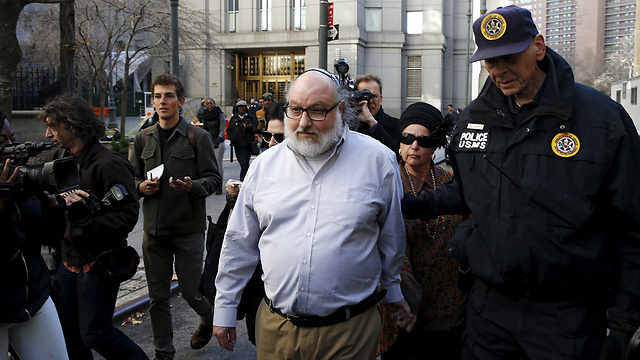
Pollard. Transferred insane amounts of first-class high-quality information
צילום: רויטרס
Jonathan Pollard: The story you didn't know
Op-ed: Eitan Haber, who served as Defense Minister Yitzhak Rabin's media advisor at the time of the Israeli spy's arrest, reveals a few unknown details about the affair which seriously damaged US-Israel relations.
As a person who has avoided sharing what he knows for more than 30 years and has only touched on the political, internal, Israeli side, I am now allowing myself to reveal a few more details, hoping and assuming that they won't hurt Jonathan Pollard and may perhaps even help clarify this sad affair:

1. How did he get in? Pollard was one of the people with the highest security classification and had access to the US Navy's intelligence network, which is connected in different ways to 20 other intelligence agencies. This means that he was capable not only of looking at basic intelligence information, but also receiving the "deepest" information. Today, when almost every person in the world has Google, it may be considered almost nothing, but more than 30 years ago it was almost everything. He was exposed to almost all intelligence information: From innocent information about swordfish in the Red Sea to the nuclear codes of the US Navy's submarines.
2. Who knew? It's customary for the political echelon, from the prime minister downwards, not to ask the leaders of the Israeli intelligence community to disclose their sources. The Mossad, Military Intelligence and Shin Bet directors are only rarely asked about it, when decisions of life and death depend on the source's identity. Pollard was recruited during Moshe Arens' term as defense minister, and operated mainly, for a relatively short time, during Yitzhak Rabin's term as defense minister.

Jonathan Pollard after his release, Friday. As opposed to what people think, the Americans did not know at first who he had spied for (Photo: Reuters) (צילום: רויטרס)
3. Who decided? The decision to recruit Pollard was made by the head of Lekem (the Bureau of Scientific Relations at the Defense Ministry), Rafi Eitan, who everyone - apart from his wife - refers to as "stinky Rafi." Eitan, an exceptional intelligence official and one of the founders of the Mossad, was Ariel Sharon's friend and one of his close associates. Rumor has it that then-Defense Minister Sharon and Eitan planned his appointment as Mossad chief, but failed. As a result, Sharon appointed Eitan as the head of Lekem, which was the Defense Ministry's secret and mysterious intelligence body. Eitan wanted to prove to the Mossad that he was capable, as the head of a small unit, of doing much more than those who rejected him in the Mossad.
4. Friendly espionage? Our claim that Pollard spied for a friendly state, an ally, is ridiculous and absurd. For any intelligence service, anywhere in the world, the exposure of any intelligence information means that the information is lost, as if it had been published at the start of every news edition.
5. How did the Americans find out? Contrary to what people think, the Americans did not know at first who Pollard had spied for. In the instructions he received, he was told to make an effort to keep quiet for 48 hours, in order to allow the Lekem people to get out of the United States. An article published in an Israeli newspaper showed the American investigators the way. By then, Pollard had transferred insane amounts of first-class high-quality information.
6. The contact. The main problem was the plan to appoint Colonel Aviem Sella as commander of the Tel Nof Base and promote him to the rank of brigadier-general, which would lead him to the position of Israel Air Force (IAF) commander. The Americans were strongly opposed to it, and even executed a series of moves to "get the Air Force down on the ground." Without the Air Force we have no army and no life. The Air Force, with the knowledge of Chief of Staff Moshe Levy and with the support of IAF Commander Major-General Amos Lapidot, convened the "Maccabi Forum" of base and unit commanders at Sde Dov and summoned Yitzhak Rabin for a sort of drumhead court-martial, in which they slammed the Americans and the Israelis (in other words, Rabin). The motto repeated by all of them was: "We won't abandon a wounded pilot in the field after he fell from his plane."
7. A near putsch. The Sde Dov debate ended at 9pm. Rabin, his military secretary Hagai Regev and I went outside. We were hit by drizzles of rain. "Well, what do you say?" the defense minister turned to us. "It's a military putsch," I told him. "I suggest that you order Amos Lapidot to file his resignation by midnight, and if he refuses we'll say that you dismissed him." "There's no need," Rabin replied. "They will realize what is happening within a day and will come back to us with their tail between their legs." The very next day, the Maccabi Forum requested a meeting with Rabin, took back its comments and apologized. Aviem Sella resigned.










